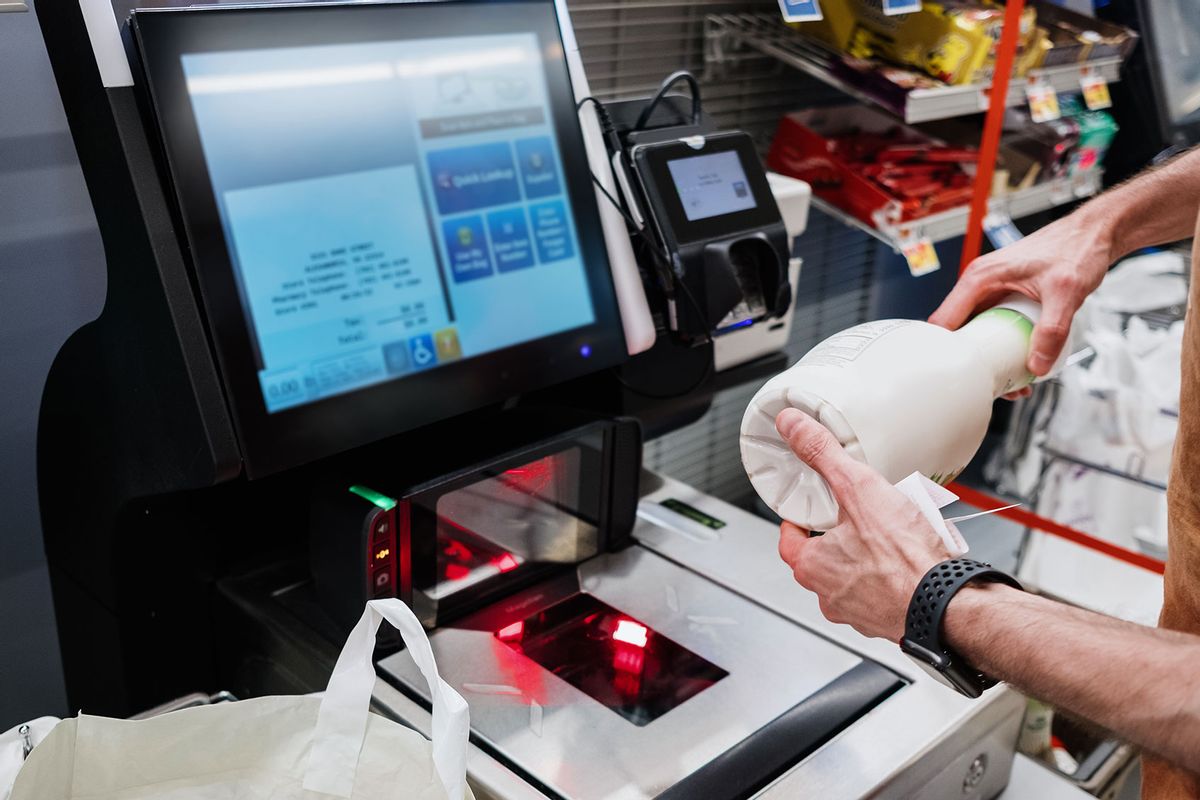Self-checkouts have long been a staple feature within retail stores nationwide, but a new study found that an increasing number of Americans are actually in favor of eliminating such technology for good.
According to a survey conducted by Redfield & Wilton Strategies exclusively for Newsweek, 43% of shoppers supported the removal of self-checkouts from retail stores. 23% said they strongly support the removal of self-checkouts and 20% said they generally support a complete removal.
The poll was conducted between June 28 and June 29 and included a sampling pool of 2,500 eligible voters within the United States. It also found that 62% of Americans didn’t like self-checkout technology because it takes away the job of an actual store cashier. 40% of Americans said they disliked self-checkouts because they prefer to speak to a person. An additional 27% of respondents said they don’t prefer such technology because it doesn’t accept cash.
As explained by Will Glaser — CEO and Founder of Grabango, the leading provider of checkout-free shopping technology for retailers across the nation — the recent findings aren’t surprising, considering that the removal of self-checkout is beneficial for both retailers and consumers.
“In particular, self-checkout causes a dramatic increase in partial shrink, where a shopper pays for some of their purchase, but not the full amount,” he explained to Newsweek. “By eliminating partial shrink, checkout-free systems more than double bottom-line grocery profits, a win-win for retailers and shoppers.”
"Regular" checkout, which features a human cashier, has been shown to boost customer loyalty to a particular retailer as opposed to automated checkout.
A study conducted by researchers at Drexel University — published in the Journal of Business Research earlier this year — found that customers feel more rewarded by a store and “feel like they were treated more valuably” when using regular checkout because it involves less effort from consumers and requires cashiers to manually scan, bag and facilitate the payment process, per CNN. Regular checkout makes customers feel that they are receiving the kind of quality service they deserve as customers of a particular store, the study found.
We need your help to stay independent
“The saved effort during the checkout process and the customers’ sense of entitlement explain the effect of checkout type on customer loyalty,” the study said. It added that the extra effort “required to checkout and bag purchases and the expectation of being served by the store were negative consequences of self-checkout and decreased loyalty to the store.”
As for retailers, a 2022 survey by ECR Retail Loss Group polled 93 retailers worldwide and found that many of them were dissatisfied with self-checkout machines. Two-thirds of retailers said self-checkouts were “becoming more of a problem.” Self-checkouts also accounted for 23% of “total unknown store losses.” A separate study by ECR noted that 63% of store workers “do not believe they can cope with their allocation” of self-checkout machines, especially when the store is busy.
In recent months, several major retailers have scaled back on self-checkout machines, citing customer feedback, increased shoplifting incidences and profit losses as key factors in their decisions. Back in April, Walmart announced that it was in the process of removing self-checkouts and returning to regular checkouts in its store in Shrewsbury, MO, a suburb of St. Louis.
Want more great food writing and recipes? Subscribe to Salon Food's newsletter, The Bite.
“As part of our announced plans for additional investments and improvements to stores across the country, we're converting the self-checkout lanes at our 7437 Watson Road store in Shrewsbury, MO., to traditional checkout lanes,” a Walmart spokesperson told CBS MoneyWatch in an email. “We believe the change will improve the in-store shopping experience and give our associates the chance to provide more personalized and efficient service.”
Walmart’s decision came after Target completely removed its self-checkout machines from 300 locations most impacted by shoplifting. Dollar Tree also cut back on its self-checkout option at thousands of its locations.
In an effort to combat theft at self-checkouts, certain stores have found ways to improve their self-checkout areas without eliminating the machines for good. In November, Costco stationed more staff at self-checkouts to combat an increase in non-members using membership cards that didn't belong to them at self-checkout. Safeway also added a receipt-scanning gate at self-checkout areas in multiple store locations and even eliminated self-checkout entirely at some stores.



Shares